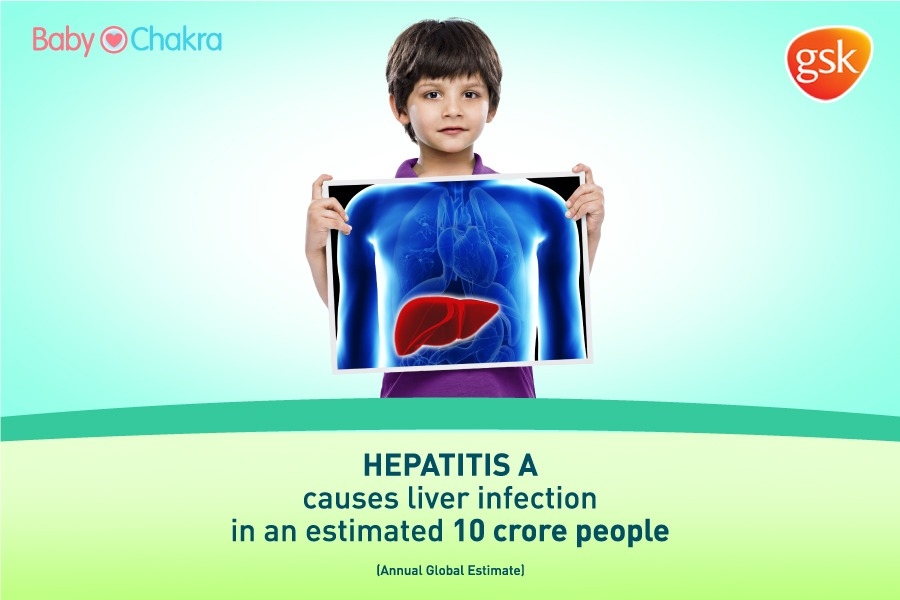
WHO estimates, globally more than 10 Cr people get infected with Hepatitis A every year: Everything you should know about Hepatitis A disease, prevention and vaccination
6 Aug 2021 | 4 min Read
Medically reviewed by
Author | Articles
Understanding what causes Hepatitis A
Hepatitis A is a contagious liver infection which is caused by the Hepatitis A virus2. Its severity can range from a mild to severe illness which can last from few weeks to months.
The World Health Organisation (WHO) estimates that globally more than 10 crore people get infected with Hepatitis A every year1. While this liver infection is generally considered mild and common among children, it can be serious in some cases3. Among older children and adults, infection usually causes more severe symptoms, jaundice being one of them occurring in more than 70% of cases.4
Hepatitis A infections do not cause chronic infections, however they can be severe.5 If left unchecked, in some cases, it can lead to severe complications like acute liver failure and death in rare cases. Outbreaks occur worldwide, especially in areas with poor sanitation6. This is why children, who are not previously exposed to this virus because of living in more hygienic urban areas, may evade Hepatitis A infection in early childhood leaving them at risk of severe infection in adolescence and adulthood.6
How does it spread?
Hepatitis A spreads through ingestion of water and food contaminated with Hepatitis A virus. It is primarily transmitted from person to person by the faecal-oral route or when someone ingests contaminated water, milk, or even foods that have not been prepared, stored, or served in a hygienic manner.
You are at risk of contracting Hepatitis A if you accidentally ingest something contaminated with Hepatitis A, like changing an infected child’s diaper and not washing your hands thoroughly after. You are even at risk if you share food and drinks at a restaurant or touch a door knob or surface that might have some undetected amounts of stool from an infected person.
Watch out for these signs and symptoms
Not everyone who is infected has symptoms. Symptoms (if developed) usually appear within 2 to 6 weeks after infection. They can include:
- Fever
- Vomiting
- Grey-coloured stools
- Fatigue
- Abdominal pain
- Joint pain
- Loss of appetite
- Nausea
- Jaundice
Remember, not everyone who is infected will show all the symptoms. In few cases, symptoms can last for as long as 6 months9

Hepatitis A – Can it be prevented?
Yes, Hepatitis A infection can be prevented. The easiest ways to protect yourself are to:
1. Drink clean water and cook food well. Avoid raw meat and shellfish and wash fruits and vegetables in clean water.
2. Remember to wash your hands with soap and water after using the toilet, changing a baby’s nappy and before preparing food and eating.
3. Ensure hygienic surroundings in and around your home.
4. Vaccination helps to protect your child against Hepatitis A
Treatment for Hepatitis A?
There is no specific treatment for Hepatitis A hence it is wise to prevent the disease by taking preventive measures. Vaccination is a reliable way to prevent Hepatitis A.
When Hepatitis A vaccination can be given?
Vaccination against Hepatitis A can be given to children aged one year and above. This is why, global and national health authorities like WHO and Indian Academy of Pediatrics recommend Hepatitis A vaccination to all eligible children1,7. Consult your Paediatrician for more information.
References:
- https://www.who.int/immunization/position_papers/PP_hep_A_july2012_summary.pdf , Accessed on 24th July 2021
- https://www.cdc.gov/hepatitis/Hepatitis A/afaq.html, Accessed on 24th July 2021
- Castaneda D, Gonzalez AJ, Alomari M, Tandon K, Zervos XB. From hepatitis A to E: A critical review of viral hepatitis. World J Gastroenterol. 2021;27(16):1691-1715
- https://www.cdc.gov/vaccines/pubs/pinkbook/hepa.html , Accessed on 24th July 2021
- https://www.who.int/news-room/fact-sheets/detail/hepatitis-a , Accessed on 24th July 2021
- https://www.iamat.org /country/india/risk/hepatitis-a, Accessed on 24th July 2021
- 124587-IAP-GUIDE-BOOK-ON-IMMUNIZATION-18-19.pdf (iapindia.org), Accessed on 29th July 2021
Disclaimer: Issued in public interest by GlaxoSmithKline Pharmaceuticals Limited. Dr. Annie Besant Road, Worli, Mumbai 400 030, India. Information appearing in this material is for general awareness only. Nothing contained in this material constitutes medical advice. Please consult your physician for medical queries, if any, or any question or concern you may have regarding your condition. Please consult your Paediatrician for the complete list of Vaccine-preventable diseases and the complete vaccination schedule for each disease. Please report adverse events with any GSK product to the company at india.pharmacovigilance@gsk.com.
CL code: NP-IN-HEPATITIS A-OGM-210001 , DoP Jul 2021
A


Related Topics for you
Suggestions offered by doctors on BabyChakra are of advisory nature i.e., for educational and informational purposes only. Content posted on, created for, or compiled by BabyChakra is not intended or designed to replace your doctor's independent judgment about any symptom, condition, or the appropriateness or risks of a procedure or treatment for a given person.
